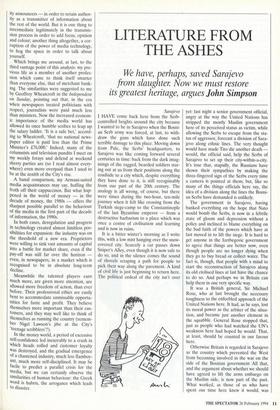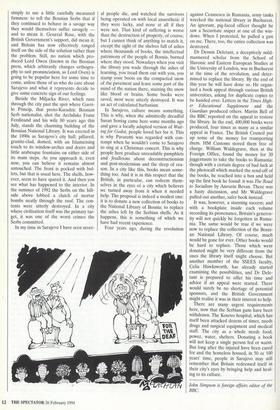LITERATURE FROM THE ASHES
We have, perhaps, saved Sarajevo from slaughter Now we must restore its greatest heritage, argues John Simpson
Sarajevo I HAVE come back here from the Serb- controlled heights around the city because I wanted to be in Sarajevo when the Bosni- an Serb army was forced, at last, to with- draw the guns which have done such terrible damage to this place. Moving down from Pale, the Serbs' headquarters, to Sarajevo was like coming forward several centuries in time: back from the dark imag- inings of the ragged, bearded soldiers star- ing out at us from their positions along the roadside to a city which, despite everything they have done to it, is still recognisably from our part of the 20th century. The analogy is all wrong, of course, but there were times during the two-hour, ten-mile journey when it felt like crossing from the Turkish siege-camp to the Constantinople of the last Byzantine emperor — from a destructive barbarism to a place which was once a centre of civilisation and learning and is now in ruins.
It is a bitter winter's morning as I write this, with a low mist hanging over the snow- covered city. Scarcely a car passes down Sniper's Alley, even though it is now safe to do so, and in the silence comes the sound of shovels scraping a path for people to pick their way along the pavement. A kind of civil life is just beginning to return here. The political ordeal of the city isn't over yet: last night a senior government official, angry at the way the United Nations has stripped the mostly Muslim government here of its perceived status as victim, while allowing the Serbs to escape from the sta- tus of aggressor, forecast a division of Sara- jevo along ethnic lines. The very thought would have made Tito die another death — would, the official said, help the Serbs of Sarajevo to set up their city-within-a-city.
It's true that, stupidly, the Russians have shown their sympathies by making the three-fingered sign of the Serbs every time a camera is pointed at them; but, like so many of the things officials here say, the idea of a division along the lines the Bosni- an Serbs have demanded is unlikely.
The government in Sarajevo, having banked everything on the hope that Nato would bomb the Serbs, is now in a febrile state of gloom and depression without a policy and inclined to blame everything on the bad faith of the powers which have at last moved in to lift the siege. It is hard to get anyone in the Izetbegovic government to agree that things are better now, even though people are no longer dying when they go to buy bread or collect water. The fact is, though, that people with a mind to start the reconstruction of Sarajevo along its old civilised lines at last have the chance to do so. And perhaps we in Britain can help them in one very specific way.
It was a British general, Sir Michael Rose, who at last brought the necessary toughness to the enfeebled approach of the United Nations here. It had, as he says, lost its moral power as the arbiter of the situa- tion, and became just another element in the squabble. General Rose stopped that, just as people who had watched the UN's weakness here had hoped he would. That, at least, should be counted in our favour here.
Otherwise Britain is regarded in Sarajevo as the country which prevented the West from becoming involved in the war on the side of the Bosnian government All that, and the argument about whether we should have agreed to lift the arms embargo on the Muslim side, is now part of the past. What worked, as those of us who have spent our time here knew it would, was simply to use a little carefully measured firmness: to tell the Bosnian Serbs that if they continued to behave in a savage way they would themselves suffer savagely — and to mean it. General Rose, with the British Government's support, did mean it; and Britain has now effectively ranged itself on the side of the solution rather than the problem. Still, no nation which pro- duced Lord Owen (known in the Bosnian press, which arbitrarily changes orthogra- phy to suit pronunciation, as Lord Oven) is going to be popular here for some time to come, unless those of us who do care about Sarajevo and what it represents decide to give some concrete sign of our feelings.
Beside the Miljacka River, which runs through the city past the spot where Gavri- lo Princip, that proto-Karadzic Bosnian Serb nationalist, shot the Archduke Franz Ferdinand and his wife 80 years ago this July, stands the charming building of the Bosnian National Library. It was erected in the 1890s as Sarajevo's city hall: pillared, granite-clad, domed, with an Islamicising touch to its window-arches and doors and little arabesque fountains on either side of its main steps. As you approach it, even now, you can believe it remains almost untouched. The front is pocked with bul- lets, but that is usual here. The shells, how- ever, seem to have spared it. And then you see what has happened to the interior. In the summer of 1992 the Serbs on the hill- side above lobbed a clutch of mortar bombs neatly through the roof. The con- tents were utterly destroyed. In a city where civilisation itself was the primary tar- get, it was one of the worst crimes the Serbs committed.
In my time in Sarajevo I have seen sever-
al people die, and watched the survivors being operated on with local anaesthetic if they were lucky, and none at all if they were not. That kind of suffering is worse than the destruction of property, of course; but I cannot think of anything to match it, except the sight of the shelves full of ashes where thousands of books, the intellectual patrimony of the people of Bosnia, burned where they stood. Nowadays when you visit the library you wade through the ashes of learning, you tread them out with you, you stamp your boots on the compacted snow of the pavement and leave some part of the mind of the nation there, staining the snow like blood or brains. Some books were saved, most were utterly destroyed. It was an act of calculated barbarism.
In Sarajevo, culture means something. This is why, when the admittedly dreadful Susan Sontag came here some months ago and gave a locally adapted version of Wait- ing for Godot, people loved her for it. This is why Pavarotti was regarded with con- tempt when he wouldn't come to Sarajevo to sing at a Christmas concert. This is why people here produce unreadable pamphlets and feuilletons about deconstructionism and post-modernism and the sleep of rea- son. In a city like this, books mean some- thing too. And it is in this respect that the British, in particular, can redeem them- selves in the eyes of a city which believes we turned away from it when it needed help. The proposal is indeed a modest one: it is to donate a new collection of books to the National Library of Bosnia; to replace the ashes left by the Serbian shells. As it happens, this is something of which we have had recent experience.
Four years ago, during the revolution against Ceausescu in Rumania, army tanks wrecked the national library in Bucharest. An ignorant, pig-faced officer thought he saw a Securitate sniper at one of. the win- dows. When I protested, he pulled a gun on me. There, too, the entire collection was destroyed.
Dr Dennis Deletant, a deceptively mild- mannered scholar from the School of Slavonic and Eastern European Studies at the University of London, was in Bucharest at the time of the revolution, and deter- mined to replace the library. By the end of this year he will have done so. He organ- ised a book appeal through various British universities, asking for duplicate copies to be handed over. Letters in the Times High- er Educational Supplement and the Guardian produced others. Martin Bell of the BBC reported on the appeal to restore the library. In the end, 400,000 books were produced, four times as many as a similar appeal in France. The British Council put up some of the money for transporting them. HM Customs stored them free of charge. William Waldegrave, then at the Foreign Office, found the money for 30 juggernauts to take the books to Rumania; though with a certain degree of bad luck at the photocall which marked the send-off of the books, he reached into a box and held up the first book he found: it was The Road to Socialism by Aneurin Bevan. There was a hasty discussion, and Mr Waldegrave pulled out another, safer book instead.
It was, however, a stunning success; and with a bookplate inside each volume recording its provenance, Britain's generos- ity will not quickly be forgotten in Ruma- nia. The same would be true if we were now to replace the collection of the Bosni- an National Library. Of course, much would be gone for ever. Other books would be hard to replace. Those which were donated might be very different from the ones the library itself might choose. But another member of the SSEES faculty, Celia Hawksworth, has already started examining the possibilities, and Dr Dele- tant is prepared to offer his time and advice if an appeal were started. There would surely be no shortage of potential sponsors, and the British Government might realise it was in their interest to help.
There are many urgent requirements here, now that the Serbian guns have been withdrawn. The Kosovo hospital, which has itself been attacked dozens of times, needs drugs and surgical equipment and medical staff. The city as a whole needs food, power, water, shelters. Donating a book will not keep a single person fed or warm.
But long after the injured have been cared for and the homeless housed, in 50 or 100 years' time, people in Sarajevo may still remember that Britain redeemed itself in their city's eyes by bringing help and heal- ing to its culture.
John Simpson is foreign affairs editor of the BBC.



























































 Previous page
Previous page